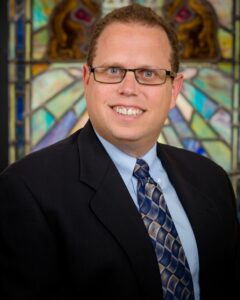
By Rabbi Daniel Plotkin
Names have power. Names have significance. Names have meanings. This is true for place names, and this is true for the names we give to people. The very first ritual that a new Jewish baby goes through is that of being granted a name, and young parents think deeply about what name to give a child, especially in choosing a relative to name the child after.
In Parshat Vayetze as well, we see the significance of names. After Jacob flees from Esau, arrives in Haran and marries Leah (unwittingly) and Rachel, the two wives engage in a battle they perceive as being about who Jacob loves more. They carry out this battle via having children, and the names of these children reflect where they are in that battle.
First, Leah has her oldest four children. Reuben she names for God having seen her plight as the unloved wife (Reu-ben [God] sees her son). Next comes Simeon, which comes from the word Shema, that God has heard she is the despised one. For Levi, she said that now her husband will attach (yilaveh) to her. With Judah, she is finally able to simply be content with her lot and give thanks (Odeh) to God.
We see this with the remainder of the sons. From Bilhah, Rachel’s maidservant and named by Rachel: Dan (Din — God has judged me) and Naftali (Naftuli — a rivalry). From Zilpah, Leah’s maidservant: Gad (fortune) and Asher (joy). Then Leah bore two more: Isaachar (Sachar — fortune) and Zebulun (Zeved — a wedding gift that she was owed from Jacob). Leah’s daughter is named Dinah, with no explanation given.
Finally, Rachel bears Jacob a son, but it is not enough for her as she names him Joseph (Yosef — may God add another). In next week’s parshah, God does grant her another, but she dies in childbirth, naming him Benoni — the son of my grief, and Jacob renamed him Benyamin, the son of his old age (Benyamim).
The Torah spends so much time on these names due to the importance names play in our lives. The Biblical and other ancient authors believed that names were destiny. We see names changed: Abram and Sari to Abraham and Sarah, Jacob to Israel and Joseph is renamed Zaphenath-paneah in Egyptian, a name suggesting he understands hidden manners.
The names we use are the names we are given, and our actions attach themselves to those names. When someone with a particular name does great things, often the frequency of that name as a new baby name increases. Likewise a name can become untouchable because of a particularly evil holder of that name (how many Adolfs are around anymore?).
Names, however, do not ultimately reveal or create our character. It is what we do and the honor we give to our name that forms who we are and how others see it. It is up to each of us to add honor to our name, and to raise it up.
Rabbi Shimon in Pirkei Avot tells us of three crowns: The crown of a king, the crown of Torah and the crown of priesthood. But then he tells us that the crown of a good name outweighs them all.
Our name is what we allow it to be, it can be a weight dragging us down if we do not do what is honorable and right, or it can be a badge of honor. This is true for our own names and the names of the communities, nations and people we represent as well.
Rabbi Daniel Plotkin, RJE, is the rabbi-educator at Temple Isaiah in Fulton.





